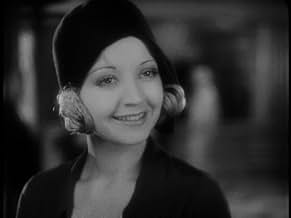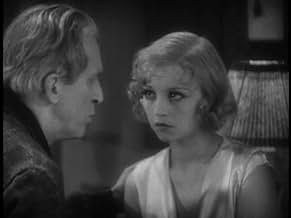Sheba has a dull boyfriend and seems destined for a dull marriage when she meets a rich playboy who has money to burn and places to go. She gets involved with the playboy and never seems to ... Read allSheba has a dull boyfriend and seems destined for a dull marriage when she meets a rich playboy who has money to burn and places to go. She gets involved with the playboy and never seems to notice that he might be shady and untrustworthy.Sheba has a dull boyfriend and seems destined for a dull marriage when she meets a rich playboy who has money to burn and places to go. She gets involved with the playboy and never seems to notice that he might be shady and untrustworthy.
- Undetermined Role
- (uncredited)
- Police Sgt. Mulligan
- (uncredited)
- Bus Passenger at Window
- (uncredited)
- Railroad Ticket-Seller
- (uncredited)
- Pirate's Den Waiter
- (uncredited)
- Detective
- (uncredited)
- Nightclub Patrol
- (uncredited)
- Specialty Dancer
- (uncredited)
Featured reviews
Like many pictures made in 1929, it looks like a silent film; its exaggerated movements and facial expressions are pure silent cinema. But this has got sound, lots of sound and apart from the stilted vocal delivery (due to poor equipment, not poor acting) it's used to great effect in enhancing the mood and feel of a time even before the Depression. Although this is horribly handicapped by being made using Warner's unwieldy Vitaphone system - which was obsolete as soon as it was invented, Mervyn LeRoy works wonders with the hand he's been dealt. These very early Vitaphone pictures were hampered by the sound recording to often be confined to a static studio set but visually this one is quite impressive with some great cinematography. In terms of storytelling, LeRoy pulls a rabbit out of the bag by making it compelling and honestly quite exciting. It is better than you'd expect because of its decent story and decent director. If you compare his innovative style with that of Edward Cline who made the atrocious SWEET MAMA, again with the lovely Alice White a few months after this, you will understand why Mervyn LeRoy is still remembered today.
The story, which is by Vina Delmar is simple but engrossing - somehow completely unrealistic yet also believable. What's it about: blonde bimbo ditches her dull, dumb idiot boyfriend for a slick, smooth creep whom to everyone but her, is obviously some sort of minor gangster. It's a cracking little plot and I honestly did not see the plot twist coming - I was genuinely surprised! The dialogue is silly but it isn't meant to be taken that seriously, it's delivered straight but it's all very tongue in cheek and works keeping everything light-hearted but still conveying the daft but enjoyable story.
Most people will watch this because of Alice White, lovely Alice White! She might have been a pretty awful actress but she's so adorable that you instantly forgive her lack of talent. Like Marilyn Monroe did twenty years later, she invented a character and became that role: Alice White was created by Alice White because that's what the movies wanted at that point in time. She had never even planned to become an actress; she was a slightly chubby, dark-haired script girl working for Charlie Chaplin with a nick name of Peter Rabbit then one day a cameraman suggested she put on a blonde wig and 'pout like a movie star' to test his equipment. From that moment, Alva White became Alice White. In this picture she really plays up to that dizzy blonde caricature of herself. Obviously she would never win any Oscars but in this one she does put some effort into proper acting and it's considered to be one of her best films.
Inexplicably Alice While isn't to everyone's taste but if she is, this is a must for you. Some of you may find her wide-eyed cuteness and sweet little girl voice unbearable but if you do you clearly are a loathsome spotted reptile with no soul.
Although director Mervyn Leroy keeps things moving at a slightly stodgy pace in the dialogue, and Miss White seems to be a nitwit, there are some nice points to this movie. For one, there are a few songs by Sam Stept and Bud Green -- and no, I don't think I've heard of them before either. Miss White sings "You Learn About Love Every Day", and it's a good song, with the tune reprised a couple of times. Another song, "That's The Lowdown on the Lowdown" is an okay piece, but it's given a fine performance by Carolynne Snowden. In addition, there's a fine moving shot with talking going on. Since this was finished and copyrighted in 1929, someone should have told the sound engineer Earl Sitar you couldn't do that, not in Hollywood. He was suitably punished by being uncredited, and being stuck in the B movies.
Although there's a lot to kvetch about here, the things that it does right outweigh those easily, particularly Morris' performance, clearly meant for a star build-up. With Richard Carlyle, Marion Byron, and George "Gabby" Hayes with his teeth in.
When the film begins, Jack (William Bakewell) takes his date, Sheba (Alice White), to a night club. But he's shocked at the prices and can't possibly afford the place on his salary...which is understandable. What isn't understandable is the drip, Jack, insisting they just go home. Not surprisingly, Sheba is NOT happy about this and a fast-talking playboy, Nicky (Chester Morris) notices...and swoops in to impress the pretty lady. Soon Nicky and Sheba are dating...but trouble looms as Nicky is a cheap crook...and ends up shooting Sheba's father!!! It's the most insane of coincidences, that's for sure!
The coincidence is bad enough...but the film is so obvious and amateurishly written that I won't recommend you watch it. Not a terrible film exactly...but far from a good one! It's a shame as I usually love Chester Morris films.
The film starts out in a nightclub named "The Pirate's Den". A big pirate-themed production number that looks like something that didn't make the final cut in Warner's revue "The Show of Shows" takes up the first five or so minutes - but Alice is nowhere in sight at this point. After the show is over, our stars appear. Sheba and Jack (Alice White and William Bakewell) are out for a night on the town, but Jack gets a headache when he looks at the prices on the menu. At the club at the same time is Nickey Solomon (Chester Morris) who seems to be a likable fellow who enjoys living well. However, he has one major character flaw - his profession is holdup man. Fortunately for the patrons of the club, this is his night off. He and Sheba meet when the club has a "legs contest" in which the female patrons are invited to participate. The curtain is lowered on the stage so you can just see the legs of the participants, and the girls then parade around the stage. Nickey is named judge, and he picks Sheba's legs as the winner(s). When the curtain is raised he sees the rest of Sheba and Nickey is quite taken by the entire package.
From this point on Nickey is wooing Sheba, and Jack, who is just a 35 dollar a week soda jerk, is having a hard time competing. The scale is weighed even more heavily in Nickey's favor due to the fact that he is a rather talented liar who has Sheba believing he is a successful businessman. Chester Morris was excellent at playing an evil guy with a nice guy facade, but here you never see the really nasty side of his nature except for one scene. Nickey makes one serious mistake for a holdup guy - driving your own car to robberies and then blowing its unique sounding horn.
This film has Alice singing only one number. Besides the opening production number there is another big costumed production number towards the middle of the film also staged at "The Pirates Den". The supporting roles are played well here too. There are a couple of older ladies that live across the alley from Sheba and her father that are always gossiping, and the part of Sheba's poor but loving father is played with heart by Richard Carlyle. Recommended for fans of early talkie fare if it ever crosses your path. In the 16 years I've been watching Turner Classic Movies I don't recall it ever being aired there.
Did you know
- TriviaIn September 1928 Warner Bros. Pictures purchased a majority interest in First National Pictures and from that point on, all "First National" productions were actually made under Warner Bros. control, even though the two companies continued to retain separate identities until the mid-1930s, after which time "A Warner Bros.-First National Picture" was often used.
- Quotes
Jack: Gee, you look sweet, Sheba. Yuh gotta date?
Sheba Miller: Yes. I'm gonna see Al Jolson.
Jack: Yuh haven't got a date with *him*, have you?
Sheba Miller: Don't be an eggnog - I'm going to the movies with Maude.
- Crazy creditsAfter the end title, there is a series of clips, accompanied by a reprise of "You Learn About Love Every Day." Needless to say, this was extremely unusual in that era.
- Alternate versionsThis movie was also released as a silent film, but no details are known.
- SoundtracksYou're My Captain Kidd
(1929) (uncredited)
Written by Sam H. Stept and Bud Green
Performed by Carolynne Snowden and chorus at the nightclub
Details
- Release date
- Country of origin
- Language
- Also known as
- Piernas triunfadoras
- Filming locations
- Production company
- See more company credits at IMDbPro
- Runtime
- 1h 6m(66 min)
- Color





















